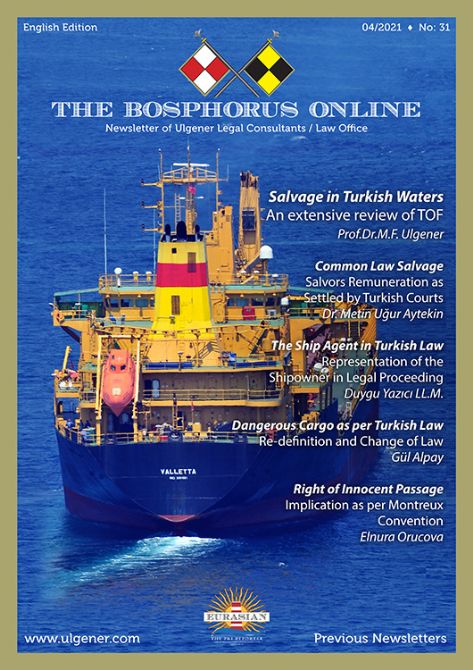
Ulgener
Representation of the Shipowners in Legal Proceedings
Duygu Yazıcı, LL.M.
Senior Associate Lawyer
[email protected]
According to the Ship Agencies Regulation, ship agent is the person or the organization acting on behalf of the shipowner or the master or the operator or the charterer in contracts and protecting their rights against third parties. As can be understood from the definition, ship agent; is the person who operates at the ports and mediates the establishment of contracts regarding services between the shipowners and the clients or the suppliers or who performs the relevant transactions on behalf of the shipowners himself or as the representative of the shipowners. According to the regulation, it cannot be held responsible for the works and transactions on behalf of the shipowners, except for its own fault.
The agencies have been granted the power to represent their principle with article 105 of the Turkish Commercial Code. According to this article, the agencies are authorized to make and accept declarations such as all kinds of warnings, notices and protests to protect the rights of their principle regarding the contracts that was brokered or conducted by the agent.
The agencies are also authorized by law to represent their principle both actively and passively in cases. Hence, they are both entitled to file a case on behalf of their principal and be a party to the case filed against their principal regarding the disputes arising from the contracts that they have brokered/concluded. However, it should not be forgotten that agents can only be a plaintiff or defendant in these cases "on behalf of their principle". Therefore, in respect of the disputes arising from the contracts that they have brokered/concluded, both the cases directly filed against the agencies or directly filed by them against the opponent party are rejected.
In general, it is possible to determine with an agreement between the agent and its principle that the agent is not authorized to represent its principle in cases. The only exception is those who act as agents on behalf of foreign merchants. According to the Turkish Commercial Code, even if it is determined between the agent and its foreign principle that the agent will not have the power to represent its principle in cases, this provision shall be null and void. Therefore, the agencies who act as an agent of a foreign company are entitled to represent their principle in cases both as plaintiff or defendant according to the law and it’s not possible to claim otherwise.
It should be noted that the agent’s power of representation is only valid for the disputes arising from the contracts that they have brokered/concluded, thus it is not possible for the agent to represent its principle in cases arising from tort (such as collision).
In respect enforcement proceedings; as it is known, the purpose of enforcement proceedings is directly to reach the assets of the addressee and to obtain the receivable by converting the assets into money. Therefore, even if the enforcement proceedings can be commenced against the agent on behalf of its principle in accordance with the established practice, the attachment proceedings can be only continued against the principle.



